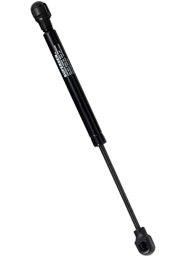 |
Gas Spring-Free Series
SUPERSEN-Gas Spring Free Series
Lifting, lowering, moving, adjusting
The gas spring can be designed with an approximately linear, progressive or degressive spring rate curve, to match the special request.
The characteristic curve of the spring describes the progression of the force of the gas spring over the stroke, from the extended to the compressed state and vice versa.
If the spring rate is flat and progresses in a practically linear manner, the force of the gas spring consequently rises only slightly over the entire spring travel.
Spring rate: X=F2:F1
The force diagram on the left shows the line of the extension and compression force with a flat spring rate. The difference between the two lines is the result of the system friction produced during compression and extension.
The measuring points F1 and F4 are each located 5~10 mm before the fully extended and compressed stroke. The measurements were conducted at a temperature of 25℃.±3℃.You can get details regarding tolerances from the technical drawings or on demand.
A choice can be made between the standard versions with eyelet end fittings or ball sockets
Further connection variants available on request.
Standard features are the proven Nislide piston rod for extended life, with high resistance to corrosion and an environmentally friendly design.Special gas spring types available with protective tube Roll-closed as standard at the pressure tube end to ensure optimal seal without weld seams and high resistance to corrosion
With different sets of seals, depending upon the application With hydraulic damping control as a result of patented labyrinth pistons (damping during extension and/or compression of the piston rod)With dynamic damping system for achieving the desired degree of damping over the entire stroke of the gas spring.
|
|
|




